The latest advances in modern preventive medicine, together with discoveries from the ancient health science of Maharishi AyurVeda®, suggest simple but powerful ways for everyone to enhance their immune system for disease prevention and health promotion.
There are five main factors to consider, which we’ll discuss one by one:

Whole foods and herbs help boost immunity
1. Rest
2. Diet and Digestion
3. Physical Activity
4. Stress Reduction
5. Herbal Supplements
For Ayurveda, we’ll take the perspective of Maharishi AyurVeda, which is the ancient science of Ayurveda revived in a holistic, comprehensive framework by Maharishi Mahesh Yogi, Founder of the Transcendental Meditation (TM) technique. For modern medicine, we’ll draw on the latest advances in preventive medicine.
Using the best of both worlds in this fashion is called integrative medicine.
The latest advances in modern preventive medicine, together with discoveries from the ancient health science of Maharishi AyurVeda, suggest simple but powerful ways for everyone to enhance their immune system for disease prevention and health promotion.
Rest and Immunity
People who don’t get enough sleep are more likely to get sick and recover more slowly from infection, research has found. Scientific studies show that sufficient sleep improves immunity and resistance to disease. Many biological processes that repair and restore the body’s normal physiological and mental functioning take place during sleep.1,2
Sleep
What is the ideal amount of sleep for promotion of health?

To optimize biorhythms for healthful sleep, go to bed by 10:00 p.m. and get up by 6:00 a.m.
It is well documented in scientific research that six to nine hours of sound sleep is best for people’s health. This comes out to seven to eight hours per night for most people—and this means regularly, not just on weekends.
To optimize the timing and quality of biological rhythms—which modern medicine calls chronobiology—the Maharishi AyurVeda approach recommends going to bed by 10:00 p.m. This is when the body’s sleep-activating hormones, mainly melatonin, naturally begin to be released and the nervous system is starting to quiet down for restful sleep.
The Maharishi AyurVeda program also recommends getting up by 6:00 a.m., when the body’s neurohormones, such as cortisol, are waking the body up and getting the physiology going for the day. So going to bed by 10:00 p.m. and waking up by 6:00 a.m. is an ideal eight-hour sleep routine for optimal well-being.
How do you know if you have had enough sleep? A simple test is whether or not you feel rested and refreshed when you wake up. If you don’t feel rested, try going to bed earlier the next night and see if you wake up naturally refreshed. Keep adjusting your schedule until you do.
Scientific research has found that sufficient sleep improves immunity and resistance to disease. Many biological processes that repair and restore the body’s normal physiological and mental functioning take place during sleep.
The Transcendental Meditation Technique
Numerous scientific studies over the past 50 years have shown that the TM technique provides a unique form of deep rest. For example, a meta-analysis of 32 studies found that TM practice produced significantly greater changes on an array of measures indicative of deep rest than did simply sitting quietly with eyes closed, including:
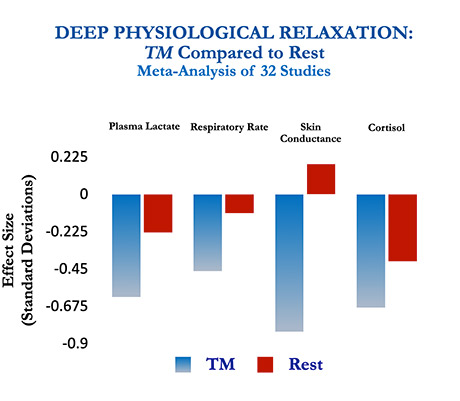
M. C. Dillbeck, and D. W. Orme-Johnson. “Physiological Differences between the Transcendental Meditation technique and Rest.” American Psychologist 42 (1987): 879–881.
• decreased plasma lactate (a metabolic by-product), which indicates rejuvenation of the body;
• decreased breath rate, which indicates a more relaxed physiology;
• decreased skin conductance, an indicator that stress is decreasing;
• decreased cortisol, a major stress hormone, indicating a holistic reduction in the stress response.
The TM technique is not a replacement for sleep; rather, TM practice for 20 minutes twice a day provides a unique state of rejuvenating rest for the mind and body in which the self-repair mechanisms of the neurophysiology can function even more efficiently.
We’ll talk more about TM practice for stress reduction in a moment.
TM practice for 20 minutes twice a day provides a unique state of rejuvenating rest for the mind and body in which the self-repair mechanisms of the neurophysiology can function even more efficiently.
Diet, Digestion, and Immunity
What you eat and how you digest is the next pillar for maintaining the strength of your immune system. Both modern and ancient preventive medicine recommend several key points.
What to Eat
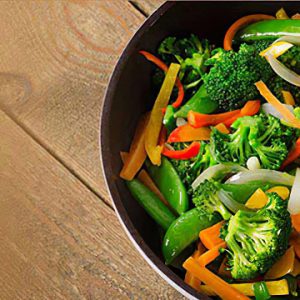
Eat whole foods, freshly cooked
Consume mainly whole foods—vegetables, fruits, whole grains, and legumes—with less processed foods and red meats.
Avoid or reduce refined sugars and grains, sugar-sweetened beverages, and fatty foods.
Favor monounsaturated oils, such as olive oil.
Consume dairy products in moderation.
Maintain adequate intake of nutrients known to support the immune system, especially vitamins C, D, and zinc. Scientific studies have shown that if you’re not getting enough of these in your diet, you may need supplementation.3
To maximize a health-promoting diet and good digestion, the Maharishi AyurVeda approach also recommends paying attention to the quality of the food; how it is prepared; and how easily it’s digested.
A healthful diet consists mainly of fresh foods. This means avoiding or minimizing leftovers and canned, frozen, packaged, or processed foods. Processing may remove some of nature’s original nutrients and may also add unwanted chemicals, such as nitrates, with known or unknown side effects. If possible, eat non-GMO (not genetically modified) and organic foods for their healthful value.
Freshly cooked, warm food is easy to digest and boosts natural immunity. Home-cooking is an ideal way to enjoy fresh and delicious meals.
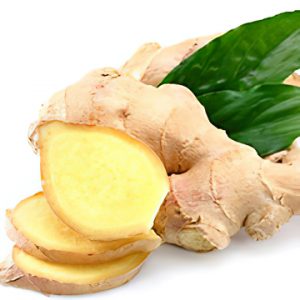
Add slices of fresh ginger to hot water for a digestion-enhancing beverage
More Tips for Easy Digestion
Avoid raw foods, although fresh fruit and some salad are OK.
Avoid cold or carbonated drinks. According to Ayurveda, these impair your digestive “fire,” or the breakdown of food in your digestive system.
Avoid heavy, hard-to-digest foods, such as deep-fried foods and sweets.
Drink or sip warm or hot water throughout the day, to enhance the digestive processes.
Add a few slices of fresh ginger to hot water, perhaps with a squeeze of lemon, for a ginger or ginger-lemon tea that fires up your digestion.
Add digestion-enhancing spices to your diet, such as turmeric, ginger, black pepper, coriander, cumin, and fennel. Add these to your cooking or to your dishes before you eat.
Here’s an easy recipe that enhances digestion and immunity.

Use herbs and spices in your kitchen
Immunity-Boosting Spice Mix
6 parts turmeric
3 parts cumin
3 parts coriander
6 parts fennel
1 part dry ginger
1 part black pepper
1/4 part ground cinnamon
Make a mixture of the powdered spices. Use about half a teaspoon, 1–3 times a day, to enhance digestion, immunity, and taste! Add to your cooking or sprinkle it on your food before eating. You can also mix in warm or hot water for a delicious, healthful tea.
Freshly cooked, warm food is easy to digest and boosts natural immunity.
How to Eat
Modern medicine now recognizes that the state of your microbiome—that wide array of microorganisms in everyone’s digestive system—is central to health and immunity. In fact, a huge portion of your immune system is in your gut.4,5
For thousands of years, the science of Ayurveda has given equal consideration to both what you eat and how you digest your food—in other words, how well your digestive system, including your microbiome, is working.6
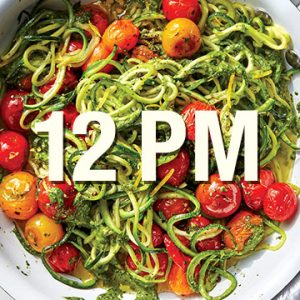
Have your main meal at noontime
How and when you eat helps you maximize your ability to digest the food and take its nutrients into every cell of your body. The Maharishi AyurVeda system of health offers the following guidelines:
Eat in moderation. You should feel physically comfortable after a meal, not overstuffed.
Eat your main meal at lunch, when the digestive enzymes are considered to be greatest.
Eat a lighter breakfast and dinner, and take your last meal of the day several hours before you go to bed.
Eat with your full attention. Avoid watching TV, texting, emailing, reading, and so on. When you are eating, attend to your eating. This connects your mind and body and strengthens digestion.
Rest for a few minutes after eating, either sitting or reclining. Taking a few minutes when you’re done, rather than jumping up from your meal, will support your digestive processes.
How and when you eat helps you maximize your ability to digest the food and take its nutrients into every cell of your body.
What to Do If You Get a Cold or Flu
For the common cold or flu, the Maharishi AyurVeda approach recommends following the preventive steps we’ve just outlined even more carefully. In addition, here are a few more things to try:

Drink a warm lemon-honey tea to soothe a sore throat or ease coughing
Drink ginger tea. A few slices of fresh ginger in hot water can help to reduce congestion as well as improve digestion, which we mentioned above.
Drink lemon-honey tea. Warm (but not hot) water with fresh-squeezed lemon and a teaspoon of raw honey can soothe a sore throat and ease coughing.
Gargle with saltwater, or saltwater plus 1/2–1 teaspoon turmeric. Many people find that this combination alleviates symptoms of sore throat and congestion. Turmeric may also have anti-inflammatory and antimicrobial effects, according to recent research.7
Try eucalyptus steam therapy. Put a drop or two of eucalyptus oil into some hot water and breathe in the steam deeply. Or use Clear Breathe, a Maharishi AyurVeda product which contains eucalyptus and other aroma oils. This clears congestion in the sinuses.
As always, be sure to consult your healthcare provider as necessary.
Turmeric may also have anti-inflammatory and antimicrobial effects, according to recent research.
Physical Activity and Immunity
Daily physical activity is another component of sustaining health in both modern and ancient approaches, and it is a key element in integrative medicine. Scientific research has found that regular and moderate physical activity enhances immunity and helps to prevent chronic diseases.8
The Maharishi AyurVeda approach defines several features of ideal exercise:

Feeling more energized after exercise is a sign of exercising well
Exercise at moderate intensity, to about 50 percent of your capacity.
Feel energized, not exhausted. You should feel more vital, more awake, and more energized after you exercise. These are signs you have exercised well.
Try Yoga asanas (positions), an ideal exercise for flexibility, strengthening, gentle movement and mind-body coordination. You can learn Maharishi Yoga® asanas at an Online Half-Day TM Retreat through your local TM Center. Find your TM Center ►
Get outside in the sun. Enjoy the outdoors when possible, and take advantage of sunlight to enhance vitamin D production and mood. Try a daily brisk walk in the fresh air and sunshine.
Rest when you’re not feeling well. At such times, your body needs its energy for repair and self-healing rather than physical exertion.
You should feel more vital, more awake, and more energized after you exercise. These are signs you have exercised well.
Stress Reduction and Immunity
Scientific research has found that stress impairs the immune system.9 Chronic and major acute stress increase the chance for infections. Reducing stress is therefore an important part of maintaining a healthy immune system and preventing disease.
The Transcendental Meditation Technique
My colleagues and I, and other medical scientists at universities and institutions around the world, have conducted and published hundreds of scientific studies on the TM technique, which is the number one form of stress reduction in the Maharishi AyurVeda approach to health. For an overview of these studies, see Scientific Research on the Transcendental Meditation Technique. Based on these results, many medical doctors worldwide recommend the TM technique to their patients to reduce stress and improve health.
Practitioners of the TM technique have been found to have lower rates of hospital admission and serious infectious diseases. In a study of 600,000 Blue Cross Blue Shield members, the TM group had a 50 percent lower hospitalization rate across all disease categories than the norm for all others. The reduction for infections was even larger: 73 percent for the category of “Nose, Throat, and Lungs” (circled in the chart). For a complete discussion of this and other research on the TM technique and immune function, see Dr. David Orme-Johnson’s Enjoy TM News article in this issue, Does TM Practice Strengthen Our Immunity?
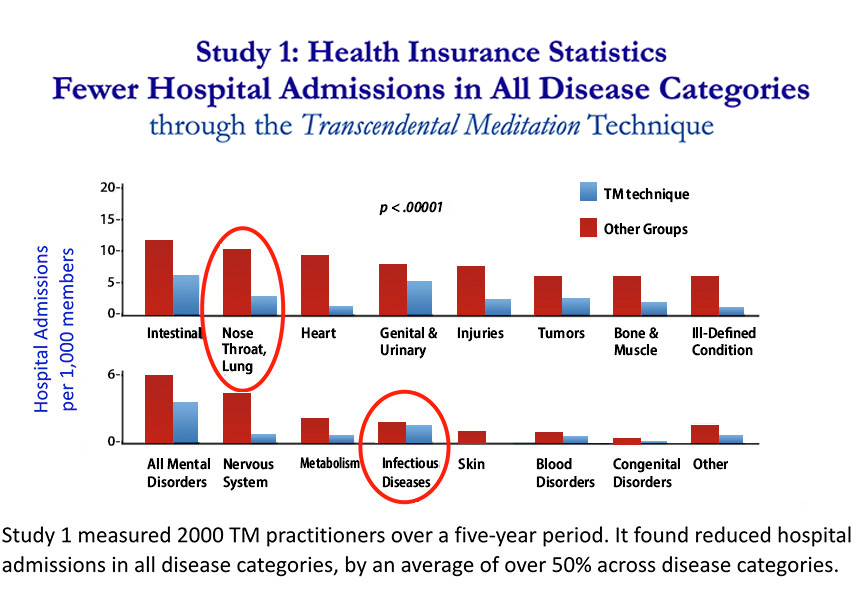
The rates of medical utilization by the TM group are shown by blue bars. Compared to the normative data for all 600,000 people insured by the company (“Other Groups,” red bars), the TM group had lower hospitalization rates in all categories of disease. D. W. Orme-Johnson. “Medical Care Utilization and the Transcendental Meditation Program.” Psychosomatic Medicine 49 (1987): 493-507. Data courtesy of Blue Cross Blue Shield of Iowa.
Research shows that regular practice of the TM technique also reduces psychological stress such as anxiety, depression, and post-traumatic stress disorder, as well as physiological conditions associated with stress, such as high blood pressure and heart disease. To learn more, see these Enjoy TM News articles on heart health and heart disease, among many others.
Physicians and other healthcare providers may be considered the warriors of contemporary society. Recently, Maharishi Foundation USA, which is the U.S. TM organization, and the David Lynch Foundation initiated a program called “Heal the Healers Now” to help reduce stress among frontline healthcare workers by providing them with the TM technique.
Stress in the people around us and in society can affect each of us, and so can stress reduction. Studies have shown that when sufficient numbers of people in a community practice the stress-reducing TM technique, there are measurable signs of reduced collective stress, such as lower crime rates. See Dr. Orme-Johnson’s article on this research, Can My TM Practice Help Create a More Peaceful World?
Research shows that regular practice of the TM technique reduces psychological stress such as anxiety, depression, and post-traumatic stress disorder, as well as physiological conditions associated with stress, such as high blood pressure and heart disease.
Nutrition for Reducing Stress
In recent years, modern medicine has begun to recognize the role of diet and nutrition in maintaining optimal mental as well as physical health.10 Following the immunity-boosting diet described above will also help reduce stress and support mental health.
In addition, the Maharishi AyurVeda approach also recommends herbal dietary supplements for reducing stress and its physiological effects, which we’ll discuss below.
Behavioral Recommendations for Reducing Stress
There are also several behaviors that scientific research has shown to reduce stress, which I reviewed in a previous article, Mind Over Aging: 10 Steps to Living a Longer, Healthier, Happier Life. To learn how these behaviors can also be tailored for your individual mind-body type, take this interactive quiz.
Social support—relationships with family, friends, and teachers. This is very important for reducing stress and improving immunity.

Staying in touch with friends and family is good for your immunity
Even though you may be “social distancing” from your friends and family, you can still talk with them by phone or video call. It is very important to maintain strong, rewarding relationships with your friends, family, teachers, co-workers, and fellow students, even while physically distancing from others.
This social support actually benefits the immune system and enhances the brain and nervous system. Research shows that social support helps to reduce stress hormones, such as oxytocin and cortisol; protect our DNA and the telomeres or caps that shield chromosomal strands from damage; lower rates of infection and chronic diseases; and contribute to longer life.11-14
It is very important to maintain strong, rewarding relationships with your friends, family, teachers, co-workers, and fellow students, even while physically distancing from others.
Calmness, stability, optimism, and perseverance. Connections between our state of mind and immunity have been discovered by a branch of modern science with a long but meaningful name, psychoneuroimmunology or PNI.15
As much as possible, the Maharishi AyurVeda approach to behavioral health recommends that you favor an attitude of optimism and perseverance along with a sense of calmness and stability. As much as is practical, maintaining an attitude of optimism actually helps balance the brain and the brain-immune system. In other words, optimism and calmness help prevent disease.
As much as is practical, maintaining an attitude of optimism actually helps balance the brain and the brain-immune system.
Herbal Supplements to Boost Immunity
Medical research suggests that plants and herbs used in traditional systems of health such as Maharishi AyurVeda may be useful for strengthening immune system function. This research examines the therapeutic potential of herbs and plants to counter pathogens, and the antiviral potential of medicinal plants.16,17
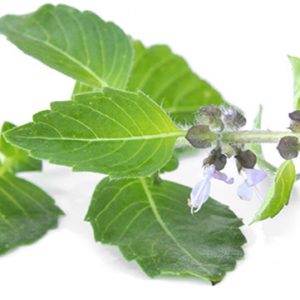
Tulsi, or holy basil, an herb used in some Maharishi AyurVeda supplements, prepared according to traditional formulas
Based on this scientific research and traditional knowledge, the Maharishi AyurVeda approach recommends several herbal products that may be used to enhance immunity and overall mind-body health. These are available from VPK by Maharishi Ayurveda International Products at mapi.com. (If you use other suppliers, be sure to look for non-GMO, organic ingredients, as well as quality assurance testing.) Follow the dosage and directions from the manufacturer.
Ashwagandha (winter cherry, W.Somnifera) is considered to be an adaptogenic herb. This means it increases the body’s resistance to stress and bolsters immunity. It also enhances energy, strength, and well-being.
Amalaki (Indian gooseberry, amla, Emblica officinalis) supports the digestion, promotes cellular generation, and supports lungs and natural immunity. It works as a powerful antioxidant for people of all ages.
Tulsi (holy basil, Ocimum sanctum) is an herb that has been used for thousands of years in traditional health systems. It supports a healthy respiratory system, including the lung and bronchial system.
Medical research suggests that plants and herbs used in traditional systems of health, such as Maharishi AyurVeda, may be useful for enhancing immune system function.
There are also traditional formulations of Ayurvedic products that include the herbal ingredients mentioned above in combinations that enhance their overall effectiveness—an effect called synergy. The following combinations of herbs are manufactured according to modern standards of quality and traditional Ayurvedic formulas with much clinical experience behind each of them. Follow the dosage and directions from the manufacturer.
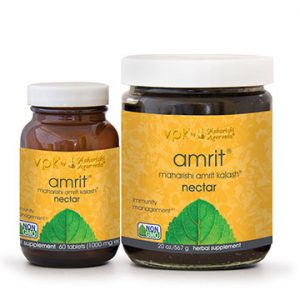
Amrit® Nectar Paste or Tablets, full-spectrum herbal antioxidants for immune strength
Cold Weather Defense is made according to a traditional formula, with Indian elecampane, licorice, holy basil, and hyssop. It helps to regulate mucus in the lungs and sinuses and supports overall immune strength.
Bio-Immune is a traditional formulation with ashwagandha, holy basil, and gotu kola. It supports natural immune strength, helps detoxify blood, and promotes cellular regeneration.
Chyawanprash is an ancient Ayurvedic formula that supports lung health, the respiratory system, and natural immune strength. It is a rejuvenative tonic to promote overall well-being, and also supports digestion, liver function, and mental functions such as memory.
Amrit® Kalash Ambrosia and Amrit® Nectar Paste or Tablets are full-spectrum herbal antioxidants for immune strength and vitality. Scientific research has reported that these formulas have a more potent antioxidant effect than vitamins C or E. Either formula may be taken alone or in combination.18
Worry Free® is a traditional formulation with ashwagandha and jatamansi. It calms the mind and emotions, supports clarity of mind and deeper sleep, and provides natural support for everyday stress and tension. Also try Worry Free® Tea.
The Best Medicine Is Prevention
With these simple lifestyle recommendations from modern preventive medicine and the Maharishi AyurVeda approach to health—stress reduction, rest, diet, enhanced digestion, and exercise—you can boost your immunity and prevention naturally.
As the adage goes, “An ounce of prevention is worth a pound of cure.”
With these simple lifestyle recommendations from modern preventive medicine and the Maharishi AyurVeda approach to health… you can boost your immunity and prevention naturally.

Robert Schneider, M.D., F.A.C.C.
Robert Schneider, M.D., F.A.C.C. is an internationally-renowned physician and scientist. He is the Dean of the College of Integrative Medicine and Director of the Institute for Natural Medicine and Prevention at Maharishi International University, and the Medical Director at The Raj AyurVeda Health Center.
Dr. Schneider has pursued a career of medical research, clinical practice, and teaching for three decades. His research has been supported by $25 million in grants from the National Institutes of Health, the Department of Defense, and other agencies, and has been published in 150 scientific publications. He has been honored as a Fellow of the American College of Cardiology.
Dr. Schneider is the principal author of the popular book Total Heart Health: How to Prevent and Reverse Heart Disease with the Maharishi Vedic Approach to Health.
Acknowledgements: The author is grateful to Stellavera Kilcher for her editorial assistance.



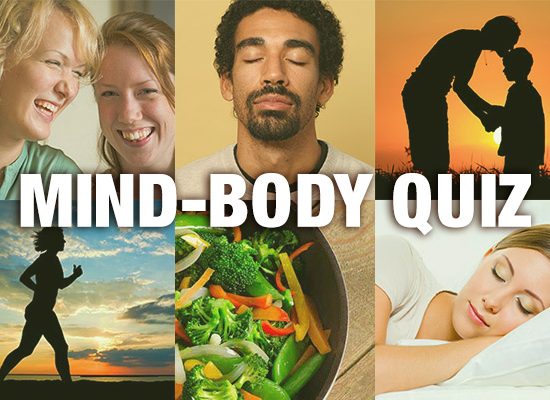

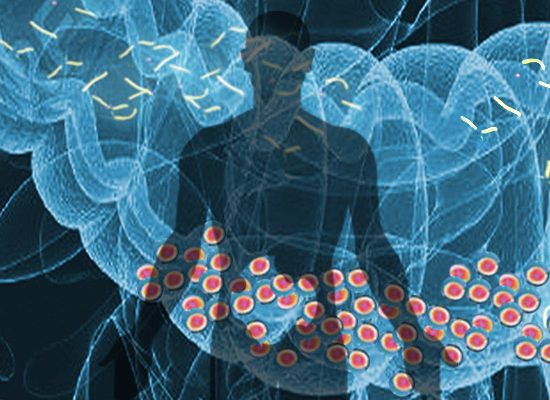
Thank you!